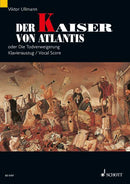| 作曲者 | Viktor Ullmann (1898-1944)・ヴィクトル・ウルマン |
| タイトル | Der Kaiser von Atlantis op. 49b |
| サブタイトル | or Death's Refusal |
| 出版社 | Schott・ショット |
| 楽器編成(詳細) | 1 (auch Picc.) · 1 · 1 · Alt-Sax. · 0 - 0 · 1 · 0 · 0 - S. (Trgl. · hg. Beck. · gr. Tamt. · kl. Tr.) (2 Spieler) - Tenor-Banjo (auch Git.) · Cemb. (auch Klav.) · Harm. - Str. (1 · 1 · 1 · 1 · 1) |
| 品番 | 9790001083904 |
| 編曲者 | Henning Brauel |
| 難易度 | 上中級 |
| 言語 | ドイツ語・英語 |
| 形状 | 114 ページ・ソフトカバー |
| 演奏時間 | 60分 |
| 作曲年 | 1943年 |
| 出版年 | 1995年 |
| 出版番号 | ED 8197 |
| ISMN | 9790001083904 |
In September 1942 Viktor Ullmann was interned in the concentration camp of Theresienstadt where he composed the opera Der Kaiser von Atlantis [The Emperor of Atlantis] on a libretto of Peter Kien, a fellow prisoner, in 1943. This opera was rehearsed by a chamber ensemble founded with the permission of the SS, but its first performance was prohibited after the final rehearsal. The autograph of the score only survived because shortly before his deportation to Auschwitz in 1944, Ullmann handed it, together with the libretto, to a friend who was able to save both manuscripts at the end of the war.The opera is a parable of a cruel emperor, whose senseless war is claiming many lives. Death puts an end to the chaos by refusing his duty - now, everyone lives for eternity. The king becomes disempowered, but the people long for a release from the pain of life. Only the voluntary death of the emperor can restore death's original purpose.The libretto is a vigorous take on the Third Reich and more particularly the concentration camp of Theresienstadt through the means of a mystery play. The music, with its numerous references to jazz and then current light music, sometimes by direct quotation, puts the composer in the role of political commentator, following the tradition of topical opera in the 1920's.



